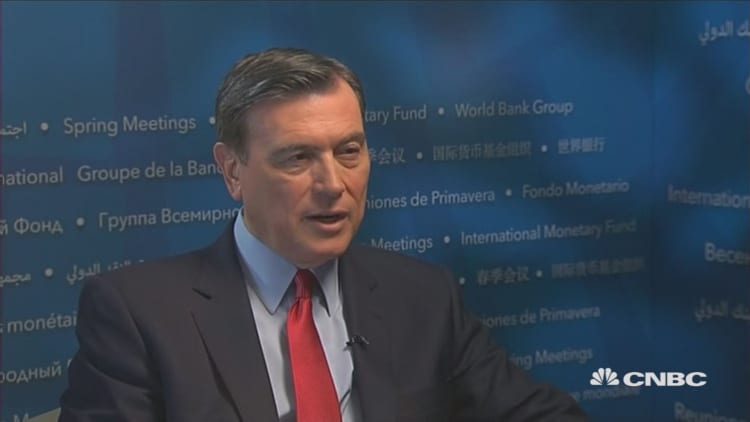
Negative interest rates and other unconventional monetary policies do not fuel political populism, a top economist at the International Monetary Fund (IMF) told CNBC, hitting back at claims they are boosting right-wing populism in Germany.
Jose Vinals, the director of monetary and capital markets at the IMF, spoke to CNBC on Wednesday, following comments from the German finance minister that the European Central Bank (ECB)'s monetary policy was encouraging the rise of the Alternative for Germany (AfD) party in Germany.
"Negative interest rates, like the other stimulus policies of the European Central Bank, are helping the European economy and politicians should be telling this message to the population," Vinals told CNBC.
"I think populism is fueled by other things and to me, one of the key sources of populism has to do with the lack of economic recovery that we have, which is not strong enough, and also with non-economic factors, which have to do with the attitudes of certain parts of the population vis-à-vis tourism or refugees," he added separately.
Germany's anti-immigration AfD party has enjoyed a dramatic rise in support in regional elections this year.
The country's finance minister is a frequent critic of the ECB's use of unconventional policies like negative interest rates and on Friday said they were partially to blame for the AfD's popularity.
"I said to (ECB President) Mario Draghi … Be very proud: you can attribute 50 percent of the results of a party that seems to be new and successful in Germany to the design of this policy," Wolfgang Schaeuble said, according to a report by the Wall Street Journal.
The German Finance Ministry did not immediately respond to a request for comment when contacted by CNBC.
Vinals has previously defended central banks' use of negative interest rates and did so again on Wednesday. He said the unconventional monetary policies used by central banks since the financial crisis of 2007-2008 were the main reason the global economy was recovering
"I would not like to have lived in a world which would have to face the consequences of central banks not having acted during the crisis. I would not have lived in another world of a Great Depression. We still went to a Great Recession, now we have an economic recovery and I think that was most importantly the work of the central banks," he told CNBC on Wednesday.
A few of the world's major central banks have adopted negative rates, including the ECB, the Bank of Japan and the Swiss National Bank, which was an earlier adopter of the policy.
Central banks that have gone negative:
- ECB: Deposit rate is -0.4 percent
- Bank of Japan: Rate is -0.1 percent for some reserves
- Swiss National Bank: Main interest rate is -0.75 percent
- Swedish National Bank: Main interest rate is -0.5 percent
- Danish National Bank: Deposit rate is -0.65 percent
In a blog post published on Sunday, Vinals and his co-authors said the economic benefits of boosting demand via negative rates outweighed the possible downsides.
However, they warned that the overuse of negative rates could encourage companies and investors to hoard cash.
Also on Sunday, Larry Fink, chief executive of Blackrock, said negative rates were "severely punishing the world's savers and creating incentives to reach for yield, pushing investors into less liquid asset classes and increased levels of risk," in a letter to shareholders.
IMF upgrades China
While the IMF cut its forecasts for world economic growth on Tuesday, it turned more positive on China. It now sees the world's second-biggest economy expanding by 6.5 percent in 2016 and 6.2 percent in 2017, 0.2 percentage points more than it forecast in January.
In its World Economic Outlook report, the body said this reflected resilient domestic demand in China and robust growth in the services sector, offsetting weakness in manufacturing.
With that in mind, Vinals denied suggestions in the market that China's economy needed either substantial exchange rate devaluation or a major fiscal stimulus program.
"What we are seeing is that thanks to the lower uncertainty about China's economic prospects, self-stabilizing forces are being operated in the foreign exchange market and that has made it a lot easier for the exchange rate to remain stable without the heavy interventions that we saw earlier in the year," he told CNBC on Wednesday.



